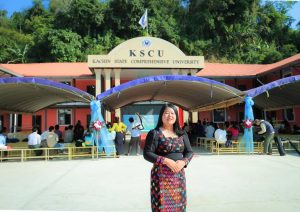Credit: Kachin News Group
Seeds of Change in a Conflict Zone: How One Student Seeks to Turn Botanical Passion into Community Healing
By Seng Mai Aung, Hyeyeon Park, and Tala Alnasser
This is the fourth in a series of articles telling the stories of students and teachers in Myanmar who have forged on with education in spite of being displaced from their homes due to the ongoing civil war that is stretching into its fifth year.

Naing Lu Ing, Botany major at KSCU
Nang Lu Ing, a young woman from the Kachin State, has lived a humble life of dedication and resilience. She is the middle child in her family, with an older sister and a younger brother. Having graduated from high school during the COVID-19 pandemic in 2020-2021, she is majoring in botany at Kachin State Comprehensive University (KSCU).
Nang Lu Ing’s passion for botany stems from her roots. Kachin State is home to a wealth of herbal plants, but their potential remains untapped. She wants to change that. Her dream is to conduct research on these plants, documenting their properties and making records that can benefit her community.
Nang Lu Ing has a profound sense of responsibility toward her people. Growing up she had observed that even though many Kachins were educated, they hesitated to take up positions at local institutions like KSCU. This left her feeling small and frustrated, wondering why her people were not fighting for their future. She believed the Kachin people needed to take more responsibility for their society’s growth through education.
“Since I can’t bring my knowledge with me when I die,” she would often say, “I want to pass it down to those who need it.”
A significant turning point in Nang Lu Ing’s life came in the summer of 2024 during a KSCU lecture series on “Faith and Resilience in Conflict” co-sponsored by the Institute for Global Engagement and the International Center for Law and Religion Studies at Brigham Young University Law School. Growing up amidst the backdrop of war, she had internalized the pain and resentment her people felt towards the Burmese. The war had deeply scarred her community, and for a long time, she held onto the belief that the Burmese were solely responsible for their suffering. It was hard for her to even bear hearing the Burmese language, despite having to learn it in school. Through the Faith and Resilience in Conflict program, though, she learned that forgiveness, though difficult, was essential for mental peace. It was not about forgetting the trauma she had endured, but rather allowing herself to heal from it. Through her interactions with her Burmese friends, she realized that not all Burmese were responsible for the pain her people had gone through. They, too, had suffered in their own ways, and there was much they could learn from each other.
Nang Lu Ing also had her critiques of the lecture series and class discussions. She found that some discussions veered too much into religious territory, which she felt distracted from the real issues at hand. To her, the conflict was not about religion, but about the cruelty of those in power. She felt it was important for her peers to focus on the root causes of their suffering, rather than getting lost in theological debates.
Still, Nang Lu Ing is deeply grateful for the knowledge and perspectives she gained from the lectures. Growing up in Laiza, a small town isolated from the rest of the world, she had never realized how vast and diverse the world truly was. The lecture series opened her eyes to global challenges that mirrored her own community’s struggles. She is thankful for the opportunity to learn and grow, and for the efforts of those who made it possible.
Another experience at KSCU vividly reinforced these lessons. During a school excursion, her group had to pass through various Burmese military bases. As they walked by one of the bases, they saw a young child, tired and barefoot, struggling with buckets of water. Her teacher, struck by the child’s vulnerability and exhaustion, handed him a small amount of money. The boy’s face lit up, and he ran back to the base, later returning with a watermelon in hand as an expression of gratitude.
It was a humbling moment for Nang Lu Ing. She realized that even in the midst of war, there were moments of grace where shared humanity outweighed situational conflict. Forgiving those who had caused her pain did not mean forgetting what had happened, but being able to move forward by allowing herself to see the good in others while staying mindful of the wrongs they had committed.
As Nang Lu Ing looks towards the future, her path is clear. She wants to dedicate herself to botany and education, passing down her knowledge and helping to build a brighter future for her people where hurt is turned to service and experience into insight. Through her educational journey, Nang Lu Ing discovered her purpose.
Seng Mai Aung is a Senior Program Officer at the Institute for Global Engagement.
Hyeyeon Park interned at IGE and is a senior at Pepperdine University majoring in Psychology and double minoring in Industrial Organization and Social Work.
Tala Alnasser interned at IGE and is a senior at Brigham Young University majoring in French Studies and Communication with an emphasis on Public Relations and minoring Sociology.